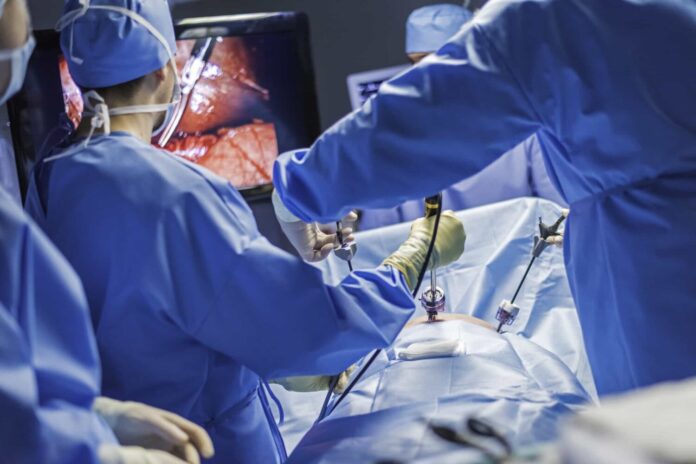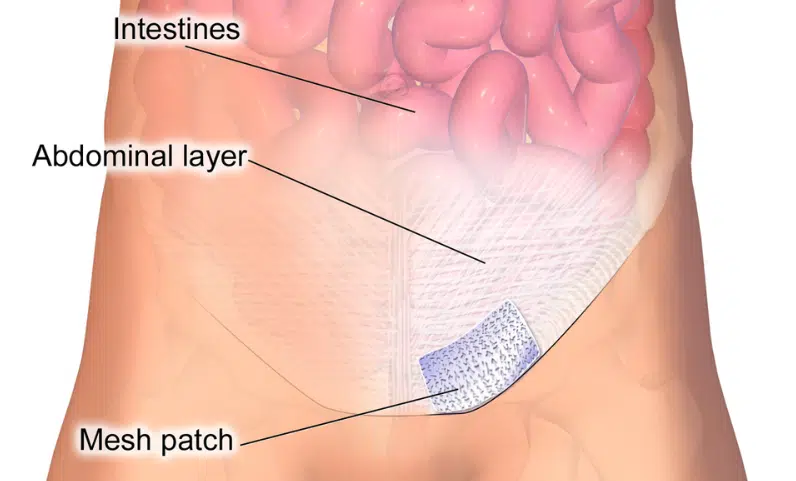Hernia mesh is a medical device used in surgeries to help repair and reinforce weak or damaged tissue in the abdominal wall. While it can be an effective treatment option for hernias, there are potential complications and risks associated with its use. In some cases, these complications can be severe and require additional medical intervention or even result in permanent damage.
If you or a loved one have experienced complications due to the medical device, it is crucial to seek the expertise of a skilled hernia mesh attorney who can navigate the complexities of your case and advocate for your rights. This article aims to provide a comprehensive understanding of hernia mesh complications and the need for legal guidance for those affected.

What is a Hernia Mesh?
A hernia mesh is a surgical implant made of synthetic materials such as polypropylene, which is a type of plastic. It is designed to provide support and strengthen weakened tissues in the abdominal wall. Also, it can help reduce the risk of recurrence by reinforcing the area and promoting tissue growth for long-term stability.
When the condition occurs, it means that an organ or fatty tissue is pushing through a weak spot in the surrounding muscle or connective tissue. This can cause discomfort, pain, and potential complications. Repair surgery is often necessary to alleviate these symptoms and prevent further complications.
During repair surgery, the mesh is placed over the weakened or torn tissue to provide support and prevent the medical condition from reoccurring. The mesh acts as a scaffold for the new tissue to grow into, ultimately strengthening the abdominal wall and reducing the risk of further complications.
The Purpose of Hernia Mesh in Surgery
The primary purpose of using hernia mesh in surgery is to provide a durable and long-lasting solution for mending this medical condition. By reinforcing the weakened area, the mesh helps distribute the pressure and tension evenly, preventing the condition from recurring.
Additionally, this medical device promotes tissue growth and integration, allowing the body to heal and strengthen the weakened abdominal wall. This integration is crucial for long-term stability and reducing the risk of complications.

Different Types of Hernia Mesh
There are various types of hernia mesh available in the market, each with its own unique characteristics and benefits. One classification of it is based on its absorbability.
Absorbable meshes are designed to break down over time and are typically used in small hernias or for temporary support. These meshes gradually degrade and are absorbed by the body, eliminating the need for future removal surgeries.
On the other hand, non-absorbable meshes are intended to remain in the body permanently and provide long-term reinforcement. These meshes are made of materials that are not absorbed by the body, ensuring their durability and stability over time.
It is worth noting that different manufacturers produce different types of these medical devices, each with its own design, composition, and specifications. These variations can impact the performance and potential complications associated with the mesh. Therefore, surgeons carefully consider the specific needs of each patient and select the most appropriate type for their individual case.
Some factors that surgeons consider when choosing a type include the patient’s overall health, the size and location of the hernia, and the potential risks and benefits associated with different mesh options. By tailoring the choice of device type to the patient’s unique circumstances, surgeons can optimize the chances of a successful and complication-free repair surgery.
Common Complications Associated with Hernia Mesh
While hernia mesh can provide numerous benefits, there are potential complications that can arise from its use. It is essential to be aware of these complications to make an informed decision about treatment options and seek appropriate medical attention if necessary.

Physical Symptoms and Side Effects
Some individuals may experience physical symptoms or side effects as a result of mesh complications. These can include chronic pain, infection, mesh migration, adhesion formation (where the mesh sticks to surrounding tissues), and recurrence of the medical condition.
It is crucial to monitor any persistent pain or discomfort after surgery and seek medical advice promptly if complications are suspected.
Psychological Impact of Hernia Mesh Complications
In addition to physical symptoms, individuals who experience complications from hernia mesh surgery may also face psychological challenges. Chronic pain and ongoing medical issues can lead to emotional distress, anxiety, depression, and reduced quality of life.
Understanding the potential psychological impact of complications is essential to ensure comprehensive support and treatment for affected individuals.
Legal Aspects of Hernia Mesh Complications
For individuals who have experienced hernia mesh complications, legal recourse may be available to seek compensation for damages and losses suffered as a result.

Grounds for Hernia Mesh Lawsuits
Common grounds for mesh-related lawsuits typically include product defects, design flaws, inadequate warnings or instructions, negligence on the part of manufacturers, or failure to conduct proper safety testing.
Each case is unique, and legal professionals specializing in hernia mesh litigation can provide guidance on the specific grounds for a lawsuit.
Recent Hernia Mesh Lawsuit Verdicts
In recent years, there have been notable hernia mesh lawsuit verdicts, with some plaintiffs being awarded significant compensation for their injuries and damages. These verdicts serve as a testament to the importance of pursuing legal action to hold manufacturers accountable for their products’ potential harm.
The Importance of Legal Guidance in Hernia Mesh Cases
When facing complications from mesh surgery, seeking legal guidance is crucial to protecting your rights and pursuing fair compensation for your damages and losses.

How a Lawyer Can Help
A skilled attorney specializing in mesh complications can provide invaluable assistance throughout the legal process. They can help evaluate your case, gather relevant evidence, navigate complex legal procedures, negotiate with insurance companies or manufacturers, and represent your best interests in court, if necessary.
Choosing the Right Lawyer for Your Hernia Mesh Case
When selecting a lawyer for your case, it is essential to consider their experience, track record, and expertise in product liability and medical device litigation. The right lawyer will provide personalized attention and support, ensuring that your voice is heard and your rights are protected.
Understanding hernia mesh complications and the need for legal guidance is crucial for individuals affected by the potential risks associated with this surgical implant. By staying informed and seeking appropriate legal assistance, those impacted can pursue justice and fair compensation for their damages and losses.









